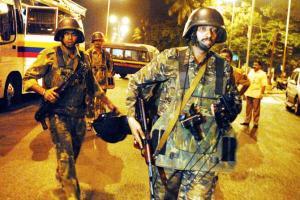Adecade since terrorists attacked our city on November 26, 2008, we have yet to take the lessons they taught us seriously

Security forces get ready to combat the terrorist who attacked Mumbai on November 26, 2008. Pic/mid-day archives
 Everyone I know has a story about that week. Where they were, what they felt like, the rumours they remember, calls from worried friends and family, news reports from all corners that gave us access to the attacks as they unfolded. Everyone I know remembers the blanket coverage on television, and the countless hours of talking heads analysing it all when the firing eventually stopped. Over 160 people died on November 26, 2008.
Everyone I know has a story about that week. Where they were, what they felt like, the rumours they remember, calls from worried friends and family, news reports from all corners that gave us access to the attacks as they unfolded. Everyone I know remembers the blanket coverage on television, and the countless hours of talking heads analysing it all when the firing eventually stopped. Over 160 people died on November 26, 2008.
ADVERTISEMENT
More than 300 were wounded, and there were coordinated attacks that went on for four days. It was the kind of tragedy that ought to have shocked any country into serious introspection. Not our country though. All we got, in the months and years following that tragedy, were statements condemning the terrorists, promises of serious revamps to how we viewed security, sweeping generalisations apportioning blame, and strong words about how the guilty would be brought to justice.
This wasn't something that affected a tiny corner of India; it was an attack on a country's financial capital, but the sheer scale of violence wasn't enough to precipitate positive changes. Switch on your television set or pick up today's newspaper for proof. Let's put aside the practical stuff, such as giving the police access to better equipment, or stronger security measures at public places that see heavy traffic.
A casual walk through any of the places that were affected — any railway station or hospital of your choice — will show just how ineffective our security measures really are, with policemen lounging behind help desks and scanning machines beeping ineffectually as millions of commuters breeze through. Let's put aside the fact that the masterminds behind the attacks still roam free, safe in the knowledge that diplomacy, politics, and bureaucracy will allow them to treat the episode with impunity. What worries me more is how we have yet to look at why these attacks were planned in the first place. What was the message being sent?
Why did terrorists feel the need to put in so much time and effort to murder innocent people? And, if they were trying to send us a message, did it go through? Did we learn what we were supposed to and change how we look at ourselves? Earlier this month, members of various political parties chose to draw our collective attention to the building of a temple. They said the same things they were saying a quarter of a century ago, made the same threats issued back then, and insisted that this was something millions of us wanted to discuss, even though none of us ever have.
This isn't even about a temple anymore, because the site itself has turned into a stomping ground for various groups to beat their chests and declare war against those who oppose them. For common Indians, there are issues that have always mattered more — public health, safety, education, employment — which never seem to occupy the minds of those elected to represent us. Is there a connection between these polarising issues and terrorist attacks?
There usually is. I sometimes wonder what law enforcement officers think about when they watch our politicians in action, raising swords, screaming battle cries, exhorting us to stand up for causes that matter to them alone. What do the men and women entrusted with maintaining the peace think as they stand on the sidelines and watch one group of Indians being pitted against another, repeatedly, because someone needs to capture a vote bank?
I am curious about how the attack of November 26 will eventually be described in our textbooks a few decades from now. More and more politicians take it upon themselves to rewrite history to suit their narratives. More and more children are denied a fair look at what has shaped us as a nation, because fiction works better for some political parties than fact. This is also why our time, energy and taxes are now diverted towards statues with impunity, flying in the face of our genuine need for better roads, hospital, and education instead.
There have been all kinds of tributes to the people who lost their lives, but almost nothing by way of trying to understand how the actions of a few lead to repercussions that affected many. What would the Bombayites who lost their lives say to us? Would they congratulate us for forgetting them as effectively as we have? Or pity us for our inability to look towards an inclusive, positive future instead of a violent, bigoted past?
When he isn't ranting about all things Mumbai, Lindsay Pereira can be almost sweet. He tweets @lindsaypereira Send your feedback to mailbag@mid-day.com
Catch up on all the latest Crime, National, International and Hatke news here. Also download the new mid-day Android and iOS apps to get latest updates
 Subscribe today by clicking the link and stay updated with the latest news!" Click here!
Subscribe today by clicking the link and stay updated with the latest news!" Click here!






